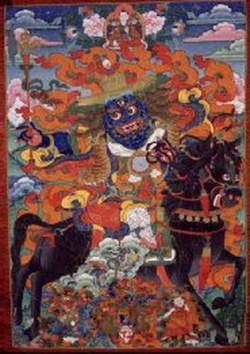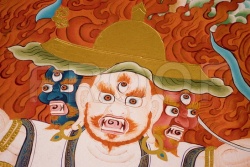Difference between revisions of "The spirit the Dalai Lama depends on."
(Created page with " <poem> Dorje Shugden's Accuser: In opposing Dorje Shugden, one of the reasons the Dalai Lama has given is that the practice of Dorje Shugden upsets Peh...") |
|||
| Line 1: | Line 1: | ||
| − | + | [[File:Pehar001.jpg|thumb|250px|]][[File:Pehar5568-3.jpg|thumb|250px|]] | |
<poem> | <poem> | ||
[[Dorje Shugden's]] Accuser: | [[Dorje Shugden's]] Accuser: | ||
| Line 11: | Line 11: | ||
"Pehar’s original [[home]] lay in the [[north]] of [[Tibet]], which the legendary [[Tibetan]] [[hero]], [[Gesar of Ling]] described as the “devil’s country”. In earlier times [[pehar]] reigned as [[war god]] of the Hor {{Wiki|Mongols}}. According to the sagas, this wild tribe was counted among the bitterest opponents of the pre-Buddhist [[Tibetans]] and their national [[hero]], [[Gesar of Ling]]. | "Pehar’s original [[home]] lay in the [[north]] of [[Tibet]], which the legendary [[Tibetan]] [[hero]], [[Gesar of Ling]] described as the “devil’s country”. In earlier times [[pehar]] reigned as [[war god]] of the Hor {{Wiki|Mongols}}. According to the sagas, this wild tribe was counted among the bitterest opponents of the pre-Buddhist [[Tibetans]] and their national [[hero]], [[Gesar of Ling]]. | ||
| − | Old documents from Tunhuang describe the Hor as “flesh-eating red {{Wiki|demons}}”. Their {{Wiki|martial}} [[king]] had laid waste to the [[Land of Snows]] and stolen its [[Wikipedia:Queen consort|queen]], the wife of [[Gesar of Ling]]. After terrible battles the [[Tibetan]] national [[hero]] defeated the rapacious Hors, and won their commitment and that of their chief [[god]], [[Pehar]], with an [[eternal]] oath of loyalty. Over the centuries the term Hor was then used to refer to various {{Wiki|Mongolian}} tribes, including those of {{Wiki|Genghis Khan}}. Hence, Pehar(the [[principal]] {{Wiki|oracle}} [[god]] of the [[Dalai Lama]]) was originally a [[bitter]] arch-enemy of the [[Tibetans]]. | + | Old documents from [[Tunhuang]] describe the Hor as “flesh-eating red {{Wiki|demons}}”. Their {{Wiki|martial}} [[king]] had laid waste to the [[Land of Snows]] and stolen its [[Wikipedia:Queen consort|queen]], the wife of [[Gesar of Ling]]. After terrible battles the [[Tibetan]] national [[hero]] defeated the rapacious Hors, and won their commitment and that of their chief [[god]], [[Pehar]], with an [[eternal]] oath of loyalty. Over the centuries the term Hor was then used to refer to various {{Wiki|Mongolian}} tribes, including those of {{Wiki|Genghis Khan}}. Hence, [[Pehar]](the [[principal]] {{Wiki|oracle}} [[god]] of the [[Dalai Lama]]) was originally a [[bitter]] arch-enemy of the [[Tibetans]]. |
Where [[Gesar]] had rendered the {{Wiki|Mongol}} [[god]] harmless, it was the [[Padmasambhava]] who first succeeded in actually putting [[Pehar]] to work. The [[saga]] tells how [[Guru Rinpoche]] pressed a [[vajra]] upon the barbaric [[god’s]] head and thus {{Wiki|magically}} mastered him. After this act, [[Pehar]] was able to be incorporated into the [[Buddhist pantheon]] as a servant. For seven hundred years his chief residence was the founding [[monastery Samye]], by the construction of which he had to assist as a “forced laborer”. About 900 years later the [[5th Dalai Lama]] moved [[Pehar]] (i.e. his [[symbol]]) to [[Nechung]] in the vicinity of the [[Drepung monastery]] and made the former [[war god]] of the Hor, the [[state oracle of Tibet]]. Since, after his “Buddhization”, he did not want to be reminded of his former defeat (by the national [[hero]], [[Gesar]]), not a single verse from the [[Gesar epic]] was allowed to be cited in the [[Drepung monastery]] or at any other location where he had stayed. | Where [[Gesar]] had rendered the {{Wiki|Mongol}} [[god]] harmless, it was the [[Padmasambhava]] who first succeeded in actually putting [[Pehar]] to work. The [[saga]] tells how [[Guru Rinpoche]] pressed a [[vajra]] upon the barbaric [[god’s]] head and thus {{Wiki|magically}} mastered him. After this act, [[Pehar]] was able to be incorporated into the [[Buddhist pantheon]] as a servant. For seven hundred years his chief residence was the founding [[monastery Samye]], by the construction of which he had to assist as a “forced laborer”. About 900 years later the [[5th Dalai Lama]] moved [[Pehar]] (i.e. his [[symbol]]) to [[Nechung]] in the vicinity of the [[Drepung monastery]] and made the former [[war god]] of the Hor, the [[state oracle of Tibet]]. Since, after his “Buddhization”, he did not want to be reminded of his former defeat (by the national [[hero]], [[Gesar]]), not a single verse from the [[Gesar epic]] was allowed to be cited in the [[Drepung monastery]] or at any other location where he had stayed. | ||
Latest revision as of 05:01, 28 July 2014
Dorje Shugden's Accuser:
In opposing Dorje Shugden, one of the reasons the Dalai Lama has given is that the practice of Dorje Shugden upsets Pehar, a fierce but supposedly subdued Mongolian spirit that manifests through the Nechung oracle. The Dalai Lama is said to have had a dream in which Pehar had fought with Dorje Shugden. On a few occasions, Pehar had accused that Dorje Shugden was undermining the Dalai Lama’s seat and would deliver Tibet to the Chinese. Pehar’s accusations against Dorje Shugden was well served by a young and beautiful female medium called Tsering Chenma, whom the Dalai Lama regarded so highly that he listens to her advice (even though she has been proven inaccurate many times) and she was even allowed to live in the Dalai Lama’s palace. On one occasion during the preparation for a Kalachakra initiation, the oracle Tsering Chenma [ see pic below] had warned that 30 Shugden supports were going to attack the Dalai Lama whereupon an intense search was done but no weapons were found and it appeared, there weren’t even any Shugdenpas present. Unlike Pehar, Dorje Shugden is an enlightened being and the emanation of Buddha Manjushri, and yet the Dalai prefers to take the advice of a spirit that was once a bitter enemy of Tibet.
I searched the web for information about Pehar because I thought it is useful to see who the accuser of Dorje Shugden is, and the following describes the spirit best:
Pehar's Origins:
"Pehar’s original home lay in the north of Tibet, which the legendary Tibetan hero, Gesar of Ling described as the “devil’s country”. In earlier times pehar reigned as war god of the Hor Mongols. According to the sagas, this wild tribe was counted among the bitterest opponents of the pre-Buddhist Tibetans and their national hero, Gesar of Ling.
Old documents from Tunhuang describe the Hor as “flesh-eating red demons”. Their martial king had laid waste to the Land of Snows and stolen its queen, the wife of Gesar of Ling. After terrible battles the Tibetan national hero defeated the rapacious Hors, and won their commitment and that of their chief god, Pehar, with an eternal oath of loyalty. Over the centuries the term Hor was then used to refer to various Mongolian tribes, including those of Genghis Khan. Hence, Pehar(the principal oracle god of the Dalai Lama) was originally a bitter arch-enemy of the Tibetans.
Where Gesar had rendered the Mongol god harmless, it was the Padmasambhava who first succeeded in actually putting Pehar to work. The saga tells how Guru Rinpoche pressed a vajra upon the barbaric god’s head and thus magically mastered him. After this act, Pehar was able to be incorporated into the Buddhist pantheon as a servant. For seven hundred years his chief residence was the founding monastery Samye, by the construction of which he had to assist as a “forced laborer”. About 900 years later the 5th Dalai Lama moved Pehar (i.e. his symbol) to Nechung in the vicinity of the Drepung monastery and made the former war god of the Hor, the state oracle of Tibet. Since, after his “Buddhization”, he did not want to be reminded of his former defeat (by the national hero, Gesar), not a single verse from the Gesar epic was allowed to be cited in the Drepung monastery or at any other location where he had stayed.
The question soon arises as to why of all gods Pehar, the former ferocious and cruel opponent of the Land of Snows, was given the delicate office of being a supernatural governmental advisor to the Tibetan “god-king”. Surely this would have sooner been the entitlement of a Bodhisattva like Avalokiteshvara or a national hero like Gesar of Ling.
With this question too, the key is to be sought in the “political theology” of the 5th Dalai Lama. We may recall that both the conferring of the title of Dalai Lama and the establishment of the hierarch’s secular power were the actions of the Mongolians and not of the Tibetan people. In contrast, as we have reported, in the 17th century the national forces of the country were actually gathered under the kings of Tsang and around the throne of the Karmapa (the leader of the “red” Kagyupa sect). Thus, it does not take much fantasy to be able to sketch out why Pehar was chosen as the advisor of the Gelugpa state (then represented by the Fifth Dalai Lama). It was expected of the former Mongolian god and opponent of Tibet that he tame the recalcitrant Tibetans (who supported the Karmapa). In this Pehar’s interest and the 5th Dalai Lama’s interests coincided. In addition, the 5th Dalai Lama himself was a descendant of an aristocratic family which traced its lineage back to the Hor Mongols. Pehar, the later state oracle, is thus a foreign deity imposed upon the Tibetan people.
Pehar's Warning For Vengeance:
It is true that the oracle god has sworn an oath of loyalty, but it is — in the lamas’ opinion — by no means ruled out that he may one day break this and unleash his full vengeance upon the Tibetans who defeated him in times gone by. He has in his own words explained to Padmasambhava what will then happen. He will destroy the houses and the fields. The children of the Land of Snows will have to endure famine and will be driven insane. The fruit of the and will be destroyed by hail and swarms of insects. The strong will be carried off and only the weak shall survive. Wars shall devastate the roof of the world. Pehar himself will interrupt the meditations of the lamas, rob their spells of their magic power, and force them to commit suicide. Brothers will rape their sisters. He will make the wisdom consorts (the mudras) of the tantra masters bad and heretical, yes, transform them into enemies of the teaching who emigrate to the lands of the unbelievers. But first he shall copulate with them. “I,” Pehar proclaims, “the lord of the temples, the stupas and scriptures, I shall possess the fair bodies of all virgins” (source: Sierksma, 1966, p. 165).
Pehar has been proven to be wrong on quite a number of occasions including, including his advice on the escape route to be taken by the Dalai Lama. Fortunately, the Dalai Lama took the advice of Dorje Shugden and safely made his way out to India. However, it is also said that Pehar is working hand in hand with Dorje Shugden to spread the Dharma and it was him who made Duldzin Drapa swear to arise as the uncommon protector

